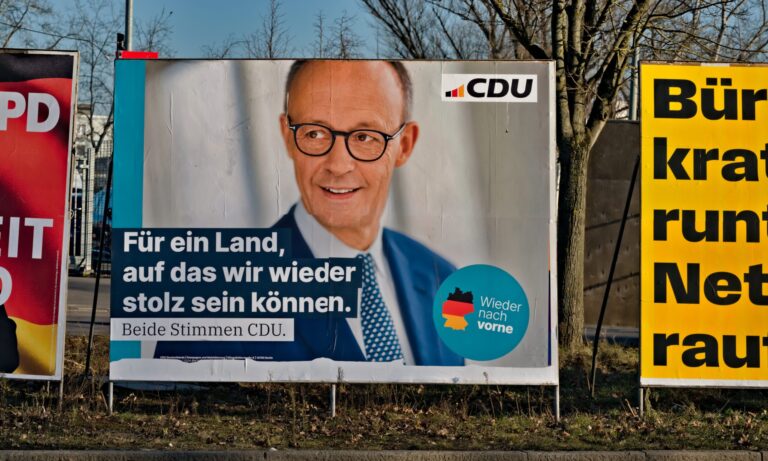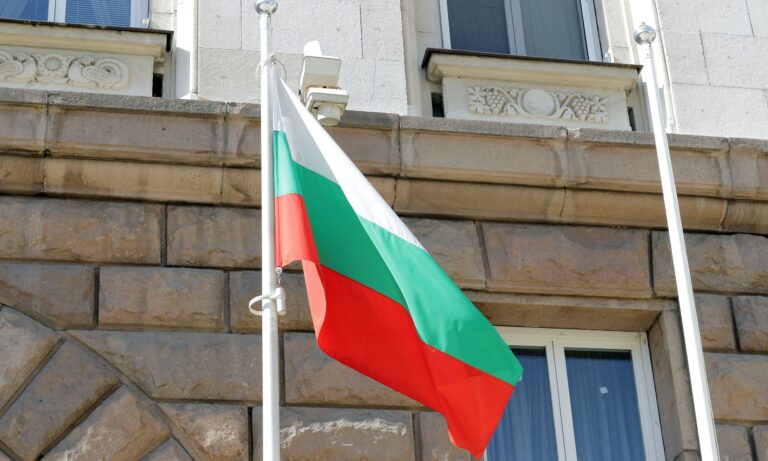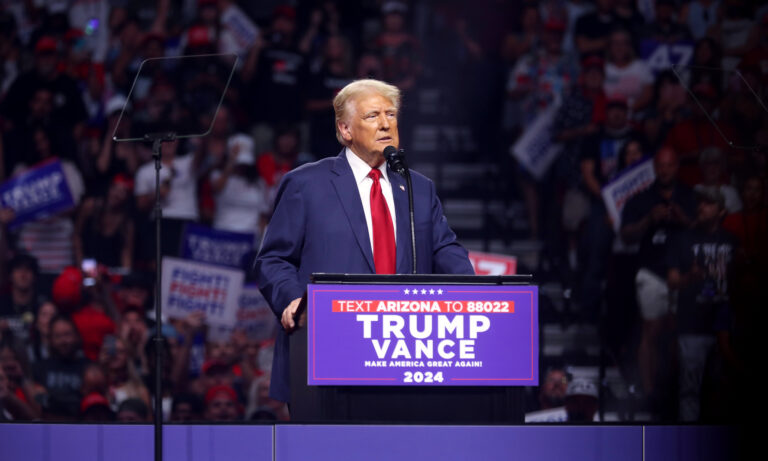The Ambiguities of Macron’s China Policy

This article is part of a series from CHOICE focusing on the impact of elections across Europe on China policy.
On April 24, in front of the Eiffel Tower and a sea of European flags, Emmanuel Macron gave his victory speech. Despite the narrowing polls, Macron secured a second five-year term with 58.8 percent of the vote. The question now is: what will he do next?
A lot can be said about the fragile domestic foundations of Macron’s new mandate. The presidential election has shown just how polarized French society is and there is a risk that voters could deny him a parliamentary majority in the upcoming June legislative elections. Were that to happen, he would end up in a cohabitation with a prime minister from a different political party, with potentially radically different priorities. This would make it difficult for Macron to pass ambitious reforms and to conduct French foreign policy.
But the fact remains that Macron still managed to defeat a powerful populist assault against European integration, coming from his main challenger Marine Le Pen and other nationalist, sovereignist, anti-capitalist and neo-communist forces, on his left and on his right.
Macron’s reelection is also a victory for the transatlantic camp – an important signal at a time when both AUKUS and Russia’s war against Ukraine have revived the old French debate regarding NATO membership – or more modestly about France’s participation in NATO’s integrated command structure.
Macron’s Balancing Act
This important context matters if we are to understand Macron’s China policy, and where it will go next. At home, Macron faces an anti-EU, anti-NATO, and to some degree anti-American opposition. Abroad, especially in the United States and in Eastern Europe, many perceive Macron’s advocacy of European sovereignty as posing a serious and strategic risk to transatlantic unity.
How will Macron navigate those forces during his second term? If his first term in power provides any indication, the President’s instinct will remain resolutely pro-European and loyal to the NATO alliance. When speaking to Xi Jinping or Joe Biden, he will seek to defend the idea of a united and coherent European position. But many Member States risk seeing this as a posture “on behalf of Europe” without sufficient prior coordination, or simply the defense of France’s own national interests under an EU cover.
Macron will try to improve policy-making inside the EU by relying on the Franco-German engine, including on relations with China. The Macron/Scholz/Xi online discussion format is a case in point. The risk, however, is that many EU countries will resent being excluded.
Similarly, many in France – including in the corporate sector – will criticize President Macron for deepening intra-European coordination and transatlantic cooperation on trade and technology issues, arguing that a protective posture vis-à-vis China does not serve their interests best. Thus, Macron’s balancing act will continue to be delicate.
Challenges of French China Policy
In his congratulatory message to President Macron on his reelection, Xi Jinping stated that “the China-France comprehensive strategic partnership has maintained a high level of development under the guidance of the two heads of state,” and praised the two sides for staying “true to the original strategic intention of their establishment of diplomatic ties by upholding independence, mutual understanding, a big picture visionary approach and win-win cooperation.”
Maintaining political stability in the France-China relationship should however not hide the fact that France and China disagree on most policy issues and currently face a stalemate in their bilateral ties. As it is impossible to do justice to all issues in bilateral relations, let’s focus on three that define Macron’s first term and highlight the interplay between the domestic and the Europe/international level.
First, Macron has been a leading advocate within the European Union of a more realistic trade and investment approach with China. Franco-German convergence on the importance of addressing the EU-China asymmetries and unbalances through the adoption of “autonomous defense instruments” has transformed the EU’s China policy in recent years.
Macron’s focus on China policy is a product of French technological and industrial interests. One national decision taken in his early first term reflects this: in July 2017, the Elysée announced the temporary nationalization of France’s leading shipyard, les Chantiers de l’Atlantique, which blocked Italian shipbuilder Fincantieri’s acquisition attempt through a share purchase agreement. The opposition to the acquisition was partly down to EU competition rules, but also because France feared technology transfers to China. Indeed, Fincantieri had been aggressively expanding its cooperation with China State Shipbuilding Corporation (CSSC) to co-produce large cruise ships in China. This had put at risk the future of Europe’s cruise ships industry, one of the last bastions of Europe’s shipbuilding.
This shipyard story points to France’s stricter approach to technology transfers, but also to the need for European industrial policies to complement the EU’s defensive instruments and the work of the transatlantic Trade and Technology Council. This should be high on Macron’s second-term agenda and will require political leadership to foster efficient public-private partnership.
Second, together with Germany and the Netherlands, France has been a leading proponent of a European Indo-Pacific strategy. To facilitate a common European approach, France has moved away from what was the initial core of its own Indo-Pacific strategy: the defense of the UN Convention on the Law of the Sea, and cooperation on non-traditional security issues. In April 2021, the EU adopted the “EU Strategy for Cooperation in the Indo-Pacific.” The EU document is all-encompassing and reiterates many foreign policy priorities that are not specific to the Indo-Pacific region, such as “sustainable and inclusive green socio-economic recovery and creating more resilient health systems.”
It could be argued that the EU Member States need sufficiently broad guidelines to step up their engagement in the Indo-Pacific. As many EU Member States are reluctant to contribute to a more stable security order in that region, whether Europe ultimately delivers the region’s needs for infrastructure development will be the best indicator of the success of the EU’s Indo-Pacific strategy.
Yet seen from France, the Indo-Pacific uncovers a tension between European coherence and transatlantic cooperation. France wants a specific space for Europe in the region, distinct from the United States. The French Ministry for Europe and Foreign Affairs now makes it clear that France intends to “champion a third path,” “beyond any logic of blocks.”
This is understandable because an approach distinct from the US can create business opportunities for European companies, and because France is a resident power in the Indo-Pacific with specific national security interests. This posture also underlines the French strategic decision to avoid direct confrontation with China, even if France is the EU country with the most regular military presence in the South China Sea and with growing defense partnerships, from India to Indonesia.
The Indo-Pacific is definitely a long-term investment for the European Union, but one that in the short term will be overshadowed by the war in Ukraine. The fact that France is unlikely to convince all its EU partners that gains await them in the Indo-Pacific will color French foreign policy during Macron’s second term.
Third, Macron’s China policy has encountered difficulties in working with some part of the French administration – not the Foreign Ministry, but the Ministry of Higher Education, which lacks knowledge of China. During his first visit to China in January 2018, the French President announced a project to “breathe new life into European sinology through the creation of a great European Institute.” Policy research on contemporary China, in particular, is scattered across Europe, and some issues, such as domestic politics, military modernization, industrial and innovation policies, or influence operations are not sufficiently understood by decision-makers and the general public.
This institute was indeed created in Paris. However, funding was discontinued in 2021 due to its poor performance. While Macron’s assessment of the need for such an institution was correct, the administration has not managed so far to turn his vision into a reality, contrary for example to Sweden, where the creation of the Swedish National China Centre at the Swedish Institute of International Affairs is considered a success.
France’s China Policy, from Warsaw to Tokyo
In his speech in Xi’an in January 2018, Macron used the Chinese expression “throw a brick to attract jade” (拋磚引玉) in a self-depreciatory manner – meaning that he was offering opinions to elicit much more valuable contributions, hoping for “shared intelligence” between Europe and China to oppose “obscurantism, Islamic terrorism, state fragility, blind nationalism that seeks brutal confrontation and always leads to war.”
COVID-19 and the strict restrictions on international people-to-people exchanges imposed by Xi Jinping have prevented that meeting of minds. Today, the lack of such exchanges is creating additional difficulties in EU-China relations. At the top level, Macron, who was not able to fulfill his 2018 promise to travel to China annually, has maintained a regular direct line to Xi Jinping, despite all the disagreements in France-China relations, from technology transfers to the Indo-Pacific. But exchanges at lower levels of government have been scant and nothing replaces people-to-people contacts.
Unlike France’s relations with Australia, Mali, or even Russia, China policy is not an area where France is relatively isolated in Europe or suffers from “strategic solitude,” to quote Michel Duclos. Realism calls for common approaches in policy areas such as trade, technology, and global governance. The equation is simple: the EU can simply achieve more than its larger Member States going it alone and letting China divide the EU undermines the interests of most.
But for Macron, the quest for a common European China policy also stems from his peculiar worldview of an international system that is increasingly shaped by the US-China bipolar rivalry, which he believes is detrimental to European interests. From that standpoint, the emerging global order is as much of a concern as the rise of a revisionist authoritarian China under the leadership of Xi Jinping is. This fundamental assessment has meant keeping some distance from the US, even at the cost of creating distrust in some EU Member States.
In the context of China’s support for the Russian invasion of Ukraine, it is sensible for France to avoid engaging with Xi Jinping in a Franco-German format. A Weimar format (inclusive of Poland) would represent a better alternative to convey a more accurate picture of Europe’s strategic reality to the Chinese leadership and build an intra-European consensus on international security affairs.
Despite a strong pro-European stance, France under a Macron presidency will retain specific national interests toward China that differ from the rest of Europe or from the United States – and a specific domestic political environment. The interests of aeronautics and luxury companies will remain a constitutive element of France’s China policy unless a war in East Asia completely changes the international order and leads to a rupture in Sino-European relations.
Finding the right balance between the interests of market access and the interests of a strong and innovative industry in France and in Europe, protected from forced and intangible technology transfers to China and elsewhere, will not be an easy task. Interestingly for France, the real center of gravity to act in the geopolitics of technology competition will not be the China policy, but Europe’s own defensive and industrial policy measures, and cooperation with the United States, but also Japan.
In sum, France’s China policy under Macron’s second term will constantly seek European unity and will continue to cultivate convergence with the United States, especially on trade and technology issues, but also on Indo-Pacific security affairs. France will nevertheless resist a policy of outright confrontation with China, partly as a reflection of a strategic view of the place of Europe in the world, partly as a pragmatic defense of French national interests.
Written by
Mathieu Duchâtel
mtdtlDr. Mathieu Duchâtel is Director of the Asia Program at Institut Montaigne since 2019. Before joining the Institute he was a Senior Policy Fellow and Deputy Director of the Asia and China Program at the European Council of Foreign Relations (2015-2018), Senior Researcher and the Representative in Beijing of the Stockholm International Peace Research Institute (2011-2015), Research Fellow with Asia Centre in Paris (2007-2011) and Associate Researcher based in Taipei with Asia Centre (2004-2007). He has spent a total of nine years in Shanghai (Fudan University), Taipei (National Chengchi University) and Beijing and has been visiting scholar at the School of International Studies of Peking University in 2011/2012 and the Japan Institute of International Affairs in 2015. He holds a Ph.D in political science from the Institute of Political Studies (Sciences Po, Paris).


